冀教版八年级下册Unit 7 Know Our World Lesson 37 Let's Learn Geography!课件(共29张PPT)
文档属性
| 名称 | 冀教版八年级下册Unit 7 Know Our World Lesson 37 Let's Learn Geography!课件(共29张PPT) | 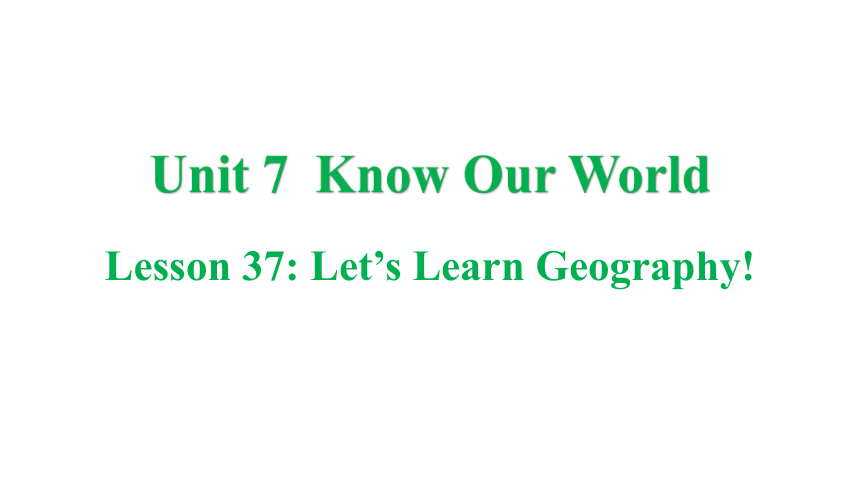 | |
| 格式 | pptx | ||
| 文件大小 | 738.6KB | ||
| 资源类型 | 教案 | ||
| 版本资源 | 冀教版 | ||
| 科目 | 英语 | ||
| 更新时间 | 2024-05-02 18:16:26 | ||
图片预览

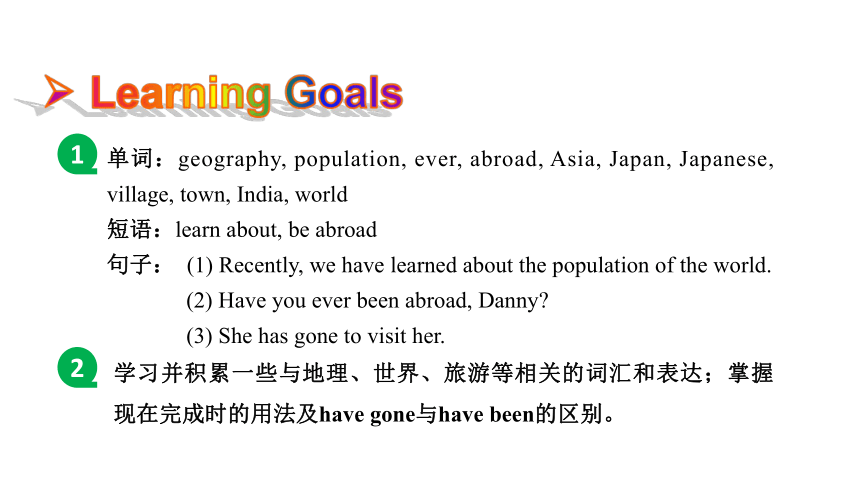
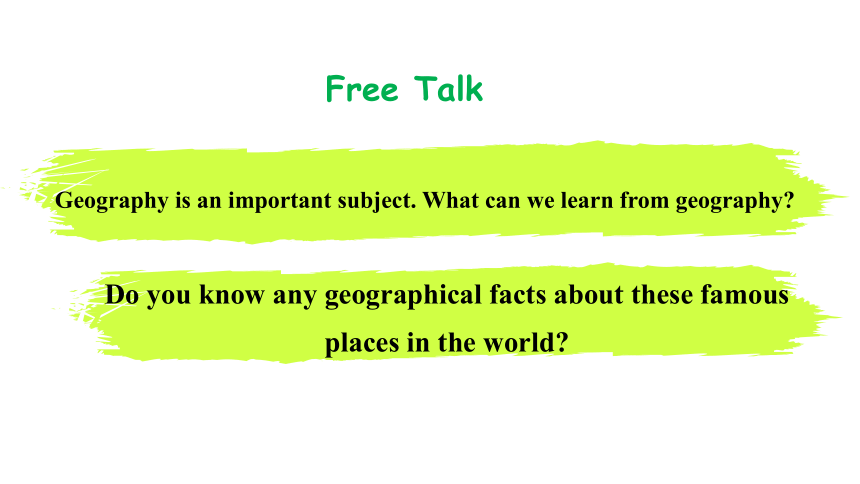
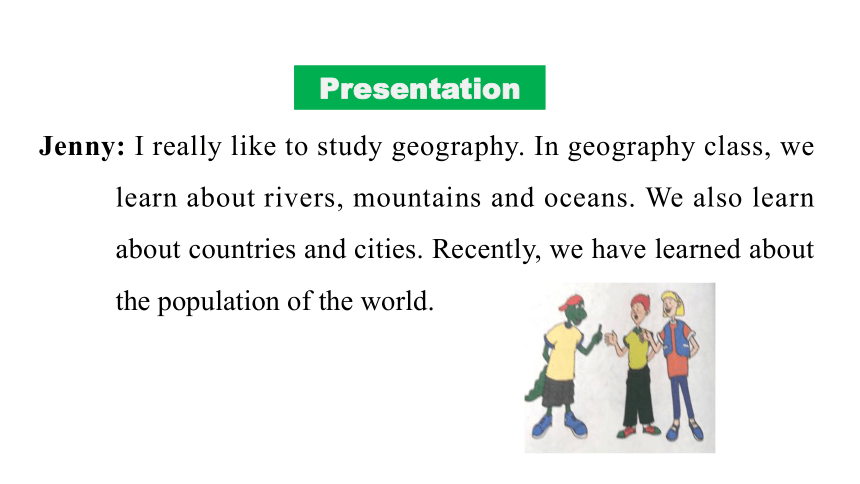
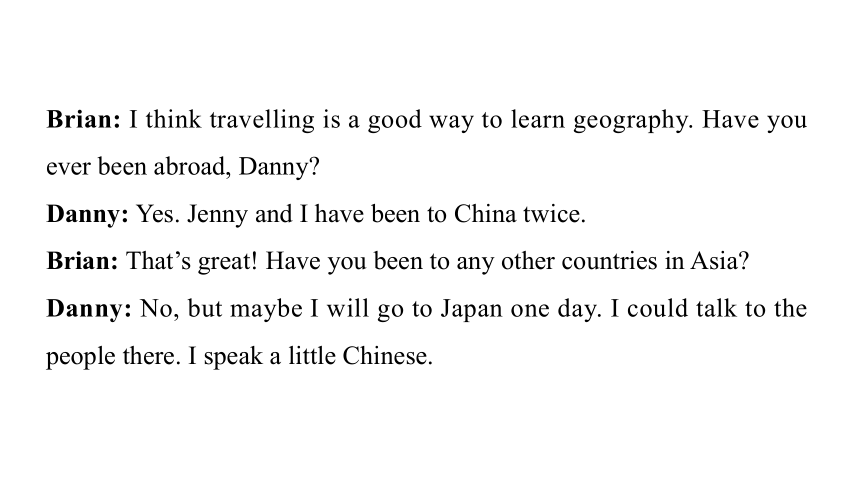
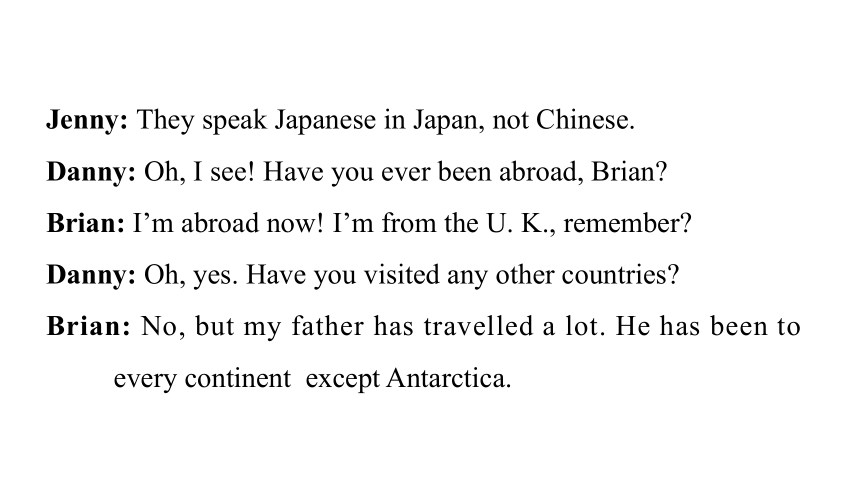
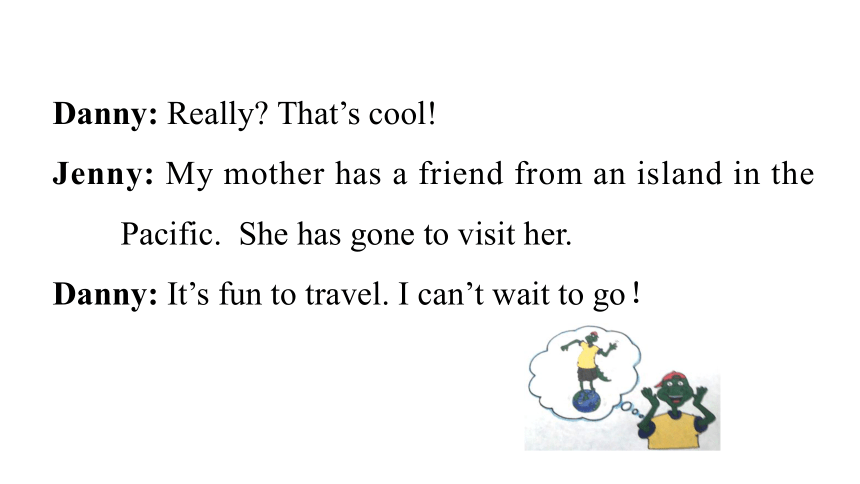
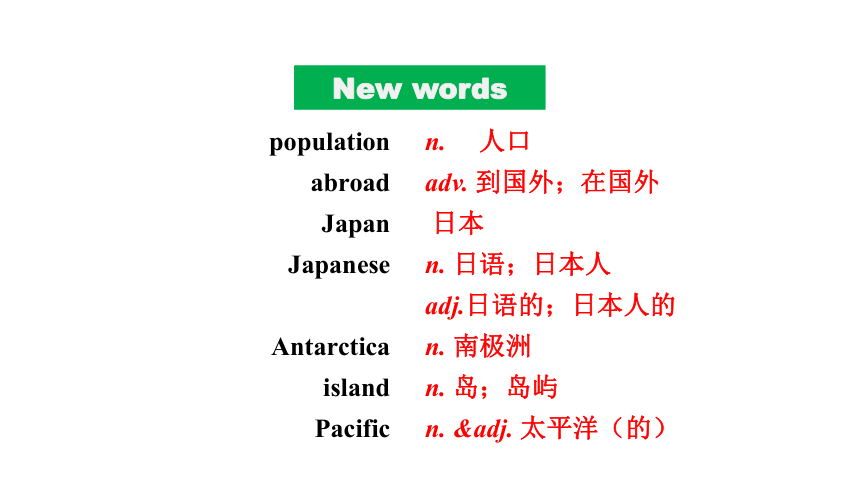
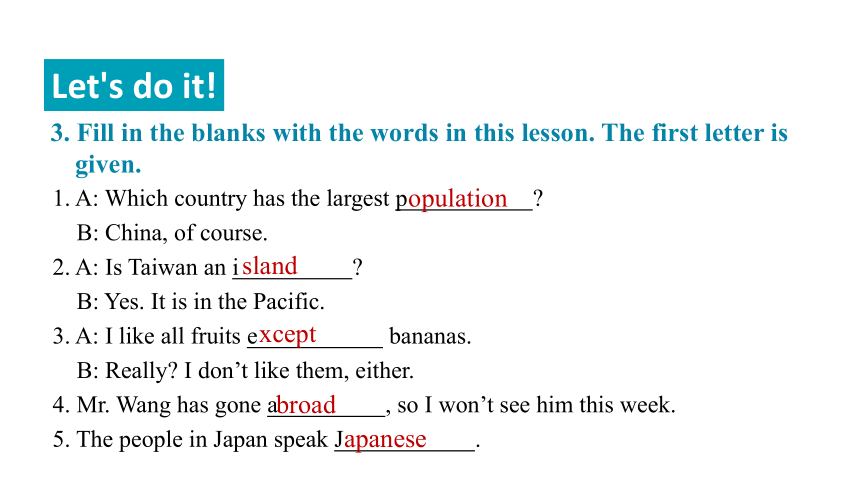
文档简介
(共29张PPT)
Lesson 37: Let’s Learn Geography!
Unit 7 Know Our World
单词:geography, population, ever, abroad, Asia, Japan, Japanese, village, town, India, world
短语:learn about, be abroad
句子: (1) Recently, we have learned about the population of the world.
(2) Have you ever been abroad, Danny
(3) She has gone to visit her.
学习并积累一些与地理、世界、旅游等相关的词汇和表达;掌握现在完成时的用法及have gone与have been的区别。
Learning Goals
1
2
Free Talk
Geography is an important subject. What can we learn from geography
Do you know any geographical facts about these famous places in the world
Presentation
Jenny: I really like to study geography. In geography class, we learn about rivers, mountains and oceans. We also learn about countries and cities. Recently, we have learned about the population of the world.
Brian: I think travelling is a good way to learn geography. Have you ever been abroad, Danny
Danny: Yes. Jenny and I have been to China twice.
Brian: That’s great! Have you been to any other countries in Asia
Danny: No, but maybe I will go to Japan one day. I could talk to the people there. I speak a little Chinese.
Jenny: They speak Japanese in Japan, not Chinese.
Danny: Oh, I see! Have you ever been abroad, Brian
Brian: I’m abroad now! I’m from the U. K., remember
Danny: Oh, yes. Have you visited any other countries
Brian: No, but my father has travelled a lot. He has been to every continent except Antarctica.
Danny: Really That’s cool!
Jenny: My mother has a friend from an island in the Pacific. She has gone to visit her.
Danny: It’s fun to travel. I can’t wait to go!
New words
population
abroad
Japan
Japanese
Antarctica
island
Pacific
n. 人口
adv. 到国外;在国外
日本
n. 日语;日本人
adj.日语的;日本人的
n. 南极洲
n. 岛;岛屿
n. &adj. 太平洋(的)
Let's do it!
3. Fill in the blanks with the words in this lesson. The first letter is given.
1. A: Which country has the largest p
B: China, of course.
2. A: Is Taiwan an i
B: Yes. It is in the Pacific.
3. A: I like all fruits e bananas.
B: Really I don’t like them, either.
4. Mr. Wang has gone a , so I won’t see him this week.
5. The people in Japan speak J .
opulation
sland
xcept
broad
apanese
1. Which countries have they been to Listen and tick the country that each person has visited.
√
√
√
2. Read the lesson and write true (T) or false (F) .
1. Brian wants to visit Japan someday. ( )
2. Jenny has never been to any Asian countries. ( )
3. Brian’s father has travelled to several different continents. ( )
4. Danny’s mother has a friend in Antarctica. ( )
F
F
T
F
Language points
1. Do you like to study geography 你喜欢学习地理吗?
geography n.地理(学)
※ The students in the classroom are learning geography.
教室里的学生正在学习地理。
2. Recently, we have learned about the population of the world. 最近,我们已经了解了一些关于世界人口的情况。
(1) learn about 了解
※ Lucy comes here to learn about Chinese culture.
露西来这儿是为了了解中国文化。
(2) population n.人口
常被看作一个整体,是人口的总称,没有复数形式。使用时要注意以下四点:
①表示“某地有多少人口”,常使用固定结构:
Sp. has a population of…=The population of sp. is…
※ Canada has a population of about 38 million.
=The population of Canada is about 38 million.
加拿大大约有三千八百万人口。
②“人口的多/少”用形容词large/big或者small来表示,不能用many/much或few/little。
※ China has a large/big population.
中国人口众多。
③population在句中作主语的时候,谓语动词使用单数形式。
※ The population of China is more than 1.4 billion.
中国的人口超过14亿。
④询问人口多少的句型:
What’s the population of… / How large is the population of…
注意:不能用how many或how much来对人口数量进行提问。
※ What’s the population of India
印度人口有多少?
3. I think travelling is a good way to learn geography. 我认为旅行是一个学习地理的好方式。
该句是一个含宾语从句的复合句,在宾语从句中,travelling是动名词作主语,其后的谓语动词用单数形式;to learn geography为动词不定式短语作后置定语,修饰a good way。
※ Learning English well is good for our future.
学好英语对我们的未来有好处。
4. Have you ever been abroad, Danny 你曾去过国外吗,丹尼?
abroad adv.在国外,到国外,出国
固定搭配:go abroad去国外;be abroad在国外
※ Lucy’s sister has been abroad for several months.
露西的姐姐已经在国外待了几个月了。
※ I have never been abroad.
我从未去过国外。
5. No, but maybe I will go to Japan one day. 没有,不过将来有一天我会去日本。
one day有一天,既可表示“将来有一天”,也可表示“过去有一天”。
※ One day, an old man came to see me.
有一天,一个老人来看我。
※ I hope to see you some day (one day).
我希望有一天能见到你。
6. They speak Japanese in Japan, not Chinese. 在日本,他们说日语不说汉语。
Japanese n.日语;日本人 adj.日语的;日本人的
当作“日本人”讲时,单复数同形。
※ I can’t speak Japanese.
我不会说日语。
※ These Japanese are visiting the Great Wall.
这些日本人正在参观长城。
7. He has been to every continent except Antarctica. 除了南极洲,他去过每一个洲。
except prep.除……之外
except 除了 表示从整体中除去同类事物
besides 除了……之外还有 表示包括所排除事物在内
except for 除了 用于对某种基本情况进行具体细节方面的修正,排除不同类事物
but 除了 只能用在no, none, nobody, nothing等词之后
辨析:except, besides, except for与but
※ Everyone is here except Ben.
除了本之外,大家都在这儿。
※ I like maths besides physics.
除了物理,我还喜欢数学。
※ Your English handwriting is good except for a few spelling mistakes.
除了几处拼写错误之外,你的英语书写很好。
※ There is nothing but a card in the box.
除了一张卡片之外盒子里什么也没有。
8. It’s fun to travel. 旅行太有意思了。
该句的句型结构为“It’s (+ not) + adj. + to do sth.”,意为“做某事(不)是……的”。
其中it作形式主语,is是系动词,fun作表语,后面的动词不定式短语作真正的主语。
※ It’s important to protect the environment.
保护环境很重要。
9. I can’t wait to go! 我等不及了!
can’t wait 等不及,迫不及待
can’t wait for sth.对某事迫不及待
can’t wait to do sth.迫不及待地做某事
※ I can’t wait for another minute.
我简直等不及了。
※ I can’t wait for his return.
我迫不及待地等他回来。
※ The kids can’t wait to open the box.
孩子们迫不及待地打开盒子。
Practice
1. The population of Russia _____(be) over 1.4 billion now.
2. My father ___________(travel) a lot recently.
3. It’s fun _________(swim) in the lake in summer.
4. My friend gave me a present. I couldn’t wait ________ (open) it.
5. ________(recent), we have learned about the population of the world.
I. 用括号内所给单词的适当形式填空。
is
has travelled
to swim
to open
Recently
II.根据汉语或首字母提示,完成单词。
1. Allan will go ______ (到国外) next month.
2. I’d like to visit some places we have learnt about in _________ (地理) lessons.
3. Students from all over the ______ (世界) come to study at Oxford.
4. Tokyo is the capital city of J_________.
5. He left his _________ (村庄) and went to work in Guangzhou.
village
abroad
geography
world
apan
III.按要求完成句子,每空一词。
1. The population of the city is 2,000,000. (对划线部分提问)
_________ _______ the population of the city
2. There are ten people in her team. (对划线部分提问)
_________ _________ _________ are there in her team
What is
How many people
Sum up
1. The new words:
geography, population, ever, abroad, Asia, Japan, Japanese, village, town, India, world
2. Important phrases:
learn about, be abroad
3. Important sentences:
(1) Recently, we have learned about the population of the world.
(2) Have you ever been abroad, Danny
(3) She has gone to visit her.
Homework
1. Remember the new words and expressions learnt in this lesson.
2. Preview Lesson 38.
Lesson 37: Let’s Learn Geography!
Unit 7 Know Our World
单词:geography, population, ever, abroad, Asia, Japan, Japanese, village, town, India, world
短语:learn about, be abroad
句子: (1) Recently, we have learned about the population of the world.
(2) Have you ever been abroad, Danny
(3) She has gone to visit her.
学习并积累一些与地理、世界、旅游等相关的词汇和表达;掌握现在完成时的用法及have gone与have been的区别。
Learning Goals
1
2
Free Talk
Geography is an important subject. What can we learn from geography
Do you know any geographical facts about these famous places in the world
Presentation
Jenny: I really like to study geography. In geography class, we learn about rivers, mountains and oceans. We also learn about countries and cities. Recently, we have learned about the population of the world.
Brian: I think travelling is a good way to learn geography. Have you ever been abroad, Danny
Danny: Yes. Jenny and I have been to China twice.
Brian: That’s great! Have you been to any other countries in Asia
Danny: No, but maybe I will go to Japan one day. I could talk to the people there. I speak a little Chinese.
Jenny: They speak Japanese in Japan, not Chinese.
Danny: Oh, I see! Have you ever been abroad, Brian
Brian: I’m abroad now! I’m from the U. K., remember
Danny: Oh, yes. Have you visited any other countries
Brian: No, but my father has travelled a lot. He has been to every continent except Antarctica.
Danny: Really That’s cool!
Jenny: My mother has a friend from an island in the Pacific. She has gone to visit her.
Danny: It’s fun to travel. I can’t wait to go!
New words
population
abroad
Japan
Japanese
Antarctica
island
Pacific
n. 人口
adv. 到国外;在国外
日本
n. 日语;日本人
adj.日语的;日本人的
n. 南极洲
n. 岛;岛屿
n. &adj. 太平洋(的)
Let's do it!
3. Fill in the blanks with the words in this lesson. The first letter is given.
1. A: Which country has the largest p
B: China, of course.
2. A: Is Taiwan an i
B: Yes. It is in the Pacific.
3. A: I like all fruits e bananas.
B: Really I don’t like them, either.
4. Mr. Wang has gone a , so I won’t see him this week.
5. The people in Japan speak J .
opulation
sland
xcept
broad
apanese
1. Which countries have they been to Listen and tick the country that each person has visited.
√
√
√
2. Read the lesson and write true (T) or false (F) .
1. Brian wants to visit Japan someday. ( )
2. Jenny has never been to any Asian countries. ( )
3. Brian’s father has travelled to several different continents. ( )
4. Danny’s mother has a friend in Antarctica. ( )
F
F
T
F
Language points
1. Do you like to study geography 你喜欢学习地理吗?
geography n.地理(学)
※ The students in the classroom are learning geography.
教室里的学生正在学习地理。
2. Recently, we have learned about the population of the world. 最近,我们已经了解了一些关于世界人口的情况。
(1) learn about 了解
※ Lucy comes here to learn about Chinese culture.
露西来这儿是为了了解中国文化。
(2) population n.人口
常被看作一个整体,是人口的总称,没有复数形式。使用时要注意以下四点:
①表示“某地有多少人口”,常使用固定结构:
Sp. has a population of…=The population of sp. is…
※ Canada has a population of about 38 million.
=The population of Canada is about 38 million.
加拿大大约有三千八百万人口。
②“人口的多/少”用形容词large/big或者small来表示,不能用many/much或few/little。
※ China has a large/big population.
中国人口众多。
③population在句中作主语的时候,谓语动词使用单数形式。
※ The population of China is more than 1.4 billion.
中国的人口超过14亿。
④询问人口多少的句型:
What’s the population of… / How large is the population of…
注意:不能用how many或how much来对人口数量进行提问。
※ What’s the population of India
印度人口有多少?
3. I think travelling is a good way to learn geography. 我认为旅行是一个学习地理的好方式。
该句是一个含宾语从句的复合句,在宾语从句中,travelling是动名词作主语,其后的谓语动词用单数形式;to learn geography为动词不定式短语作后置定语,修饰a good way。
※ Learning English well is good for our future.
学好英语对我们的未来有好处。
4. Have you ever been abroad, Danny 你曾去过国外吗,丹尼?
abroad adv.在国外,到国外,出国
固定搭配:go abroad去国外;be abroad在国外
※ Lucy’s sister has been abroad for several months.
露西的姐姐已经在国外待了几个月了。
※ I have never been abroad.
我从未去过国外。
5. No, but maybe I will go to Japan one day. 没有,不过将来有一天我会去日本。
one day有一天,既可表示“将来有一天”,也可表示“过去有一天”。
※ One day, an old man came to see me.
有一天,一个老人来看我。
※ I hope to see you some day (one day).
我希望有一天能见到你。
6. They speak Japanese in Japan, not Chinese. 在日本,他们说日语不说汉语。
Japanese n.日语;日本人 adj.日语的;日本人的
当作“日本人”讲时,单复数同形。
※ I can’t speak Japanese.
我不会说日语。
※ These Japanese are visiting the Great Wall.
这些日本人正在参观长城。
7. He has been to every continent except Antarctica. 除了南极洲,他去过每一个洲。
except prep.除……之外
except 除了 表示从整体中除去同类事物
besides 除了……之外还有 表示包括所排除事物在内
except for 除了 用于对某种基本情况进行具体细节方面的修正,排除不同类事物
but 除了 只能用在no, none, nobody, nothing等词之后
辨析:except, besides, except for与but
※ Everyone is here except Ben.
除了本之外,大家都在这儿。
※ I like maths besides physics.
除了物理,我还喜欢数学。
※ Your English handwriting is good except for a few spelling mistakes.
除了几处拼写错误之外,你的英语书写很好。
※ There is nothing but a card in the box.
除了一张卡片之外盒子里什么也没有。
8. It’s fun to travel. 旅行太有意思了。
该句的句型结构为“It’s (+ not) + adj. + to do sth.”,意为“做某事(不)是……的”。
其中it作形式主语,is是系动词,fun作表语,后面的动词不定式短语作真正的主语。
※ It’s important to protect the environment.
保护环境很重要。
9. I can’t wait to go! 我等不及了!
can’t wait 等不及,迫不及待
can’t wait for sth.对某事迫不及待
can’t wait to do sth.迫不及待地做某事
※ I can’t wait for another minute.
我简直等不及了。
※ I can’t wait for his return.
我迫不及待地等他回来。
※ The kids can’t wait to open the box.
孩子们迫不及待地打开盒子。
Practice
1. The population of Russia _____(be) over 1.4 billion now.
2. My father ___________(travel) a lot recently.
3. It’s fun _________(swim) in the lake in summer.
4. My friend gave me a present. I couldn’t wait ________ (open) it.
5. ________(recent), we have learned about the population of the world.
I. 用括号内所给单词的适当形式填空。
is
has travelled
to swim
to open
Recently
II.根据汉语或首字母提示,完成单词。
1. Allan will go ______ (到国外) next month.
2. I’d like to visit some places we have learnt about in _________ (地理) lessons.
3. Students from all over the ______ (世界) come to study at Oxford.
4. Tokyo is the capital city of J_________.
5. He left his _________ (村庄) and went to work in Guangzhou.
village
abroad
geography
world
apan
III.按要求完成句子,每空一词。
1. The population of the city is 2,000,000. (对划线部分提问)
_________ _______ the population of the city
2. There are ten people in her team. (对划线部分提问)
_________ _________ _________ are there in her team
What is
How many people
Sum up
1. The new words:
geography, population, ever, abroad, Asia, Japan, Japanese, village, town, India, world
2. Important phrases:
learn about, be abroad
3. Important sentences:
(1) Recently, we have learned about the population of the world.
(2) Have you ever been abroad, Danny
(3) She has gone to visit her.
Homework
1. Remember the new words and expressions learnt in this lesson.
2. Preview Lesson 38.
同课章节目录
- Unit 1 Spring Is Coming
- Lesson 1 How's the weather?
- Lesson 2 It's Getting Warmer!
- Lesson 3 Sun Is Rising
- Lesson 4 The Spring City
- Lesson 5 Babysitting on a Spring Day
- Lesson 6 Stories about Spring
- Unit 2 Plant a Plant
- Lesson 7 Planting Trees
- Lesson 8 Why Are Plants Important?
- Lesson 9 Gardening with Mary
- Lesson 10 Make Your Garden Grow!
- Lesson 11 Amazing Plants
- Lesson 12 Danny's Plant
- Unit 3 Animals Are Our Friends
- Lesson 13 Danny's Big Scare
- Lesson 14 Amazing Animals
- Lesson 15 The Zoo Is Open
- Lesson 16 The Pear Escaped
- Lesson 17 Save the Tigers
- Lesson 18 Friendship Between Animals
- Unit 4 The Internet Connects Us
- Lesson 19 How Do You Use the Internet?
- Lesson 20 A Computer Helps!
- Lesson 21 Books or Computers?
- Lesson 22 Travel on the Internet
- Lesson 23 The Internet--Good or Bad?
- Lesson 24 An E-mail to Grandpa
- Unit 5 Buying and Selling
- Lesson 25 Raising Money
- Lesson 26 Cookies, Please!
- Lesson 27 Business English
- Lesson 28 Ms. Liu's Great Idea
- Lesson 29 How to Push a Product
- Lesson 30 A Cookie Sale
- Unit 6 Be a Champion!
- Lesson 31 Don't Fall, Danny
- Lesson 32 My Favourite Record
- Lesson 33 2800 Years of Sports
- Lesson 34 Modern Olympics
- Lesson 35 The Dream Team
- Lesson 36 Classroom Olympics
- Unit 7 Know Our World
- Lesson 37 Let's Learn Geography!
- Lesson 38 The World Is a Big Place
- Lesson 39 Ring Up or Call?
- Lesson 40 Body Language
- Lesson 41 A Class of the World
- Lesson 42 North America
- Unit 8 Save Our World
- Lesson 43 Let's Clean Up!
- Lesson 44 Environment Clubs
- Lesson 45 Let's Sort Garbage!
- Lesson 46 Protect Our Environment
- Lesson 47 Connected to Nature
- Lesson 48 Garbage Is Interesting!
